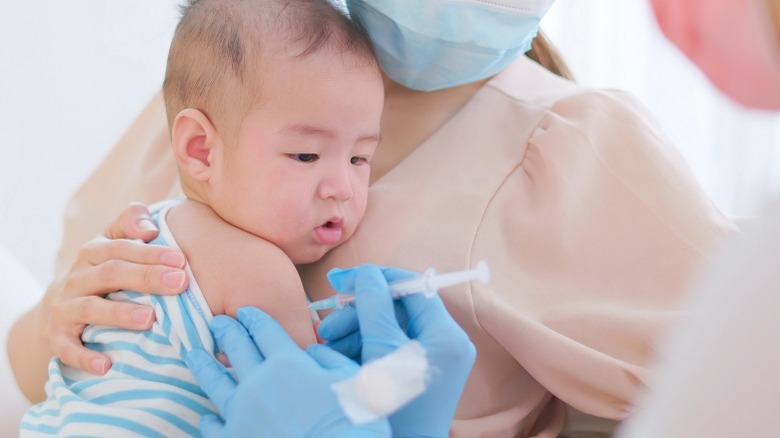What You Need To Know About Vaccine Effectiveness If Your Child Was Born By C-Section
Giving birth can be a delicate process. While vaginal births are often safer than cesarean sections for the carrier, sometimes a C-section can be the best course of action under certain circumstances, per Nationwide Children's. What happens to your body after you give birth can involve a host of physical changes. And one study found that Instagram can adversely affect a postpartum mom's mental health. But regardless of how a baby arrives, new research shows that how a baby is born, either vaginally or via C-section, could affect their receptivity to certain vaccines given in infancy.
Dr. Debby Bogaert, an author of a study that was published in "Nature Communications," told US News that "although we observed differences in how the two different groups of babies responded to the vaccines, there was still enough of an immune response in both groups to provide protection against infection." No matter the route, vaccinating babies is still one of the best ways to protect them from diseases, per the CDC, which also states that 4 million lives are saved each year due to childhood immunization.
Infants born vaginally have higher antibodies
The study, which was based on an initial cohort of 120 infants, found that infants who were born vaginally and consequently breastfed had higher concentrations of antibodies after being given pneumonia and meningococcal vaccines for those specific diseases, per US News. (In the US, babies do not typically receive a meningococcal vaccine until childhood, per the CDC. This study was conducted in the Netherlands and adhered to Dutch health protocols.) Specifically, babies born vaginally had higher levels of pneumonia antibodies in their saliva after one year compared to babies born via C-section, and higher levels of meningitis antibodies after 18 months.
Dr. Bogaert told Newsweek that, "Our research suggests that C-section-born babies mount less strong responses to the studied vaccines compared to naturally born babies."
The research also does not suggest that babies born via C-section will be at a higher risk of developing certain diseases compared to babies delivered vaginally, per US News.
Studies suggest that there is a symbiosis between our immune systems and microbiomes, where each shapes the other. When babies are born vaginally, they are immediately exposed to certain microbiota in the birth canal that babies born via C-section are not, per Science Daily. Dr. Debby Bogaert also told Newsweek that, "The composition of the microbiome in C-section-born babies indeed catches up in the months following birth," Bogaert said. "However, we know that especially the first weeks to months in life are essential for immune system maturation in life."

